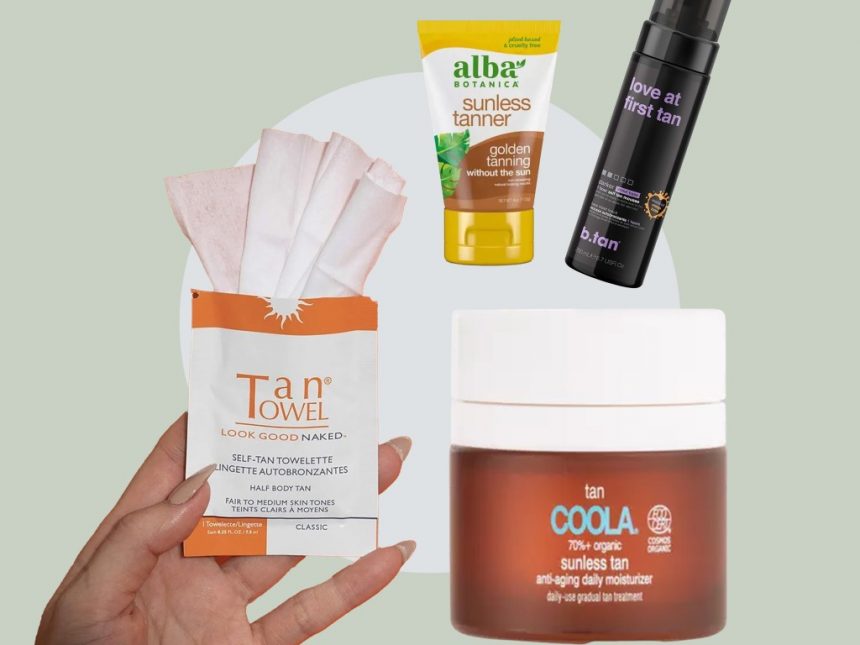If you purchase an independently reviewed product or service through a link on our website, SheKnows may receive an affiliate commission. For many of us, spring and summer present an opportunity to soak in as much sunshine as possible. But if you’re pregnant, doctors say you should try to stay out of the direct sun as much as possible, particularly in the first trimester, as too much sun can decrease the amount of the crucial pregnancy nutrient folic acid, according to Northwestern Medicine. However, you don’t have to give up your sunkissed glow just because you’re expecting. In addition to applying a great pregnancy-safe SPF from head to toe every day, make a pregnancy-safe self-tanner or tinted moisturizer your go-to product for getting bronzy, no sun required. Luckily, not all self-tanners are safe to use during pregnancy, though. We asked a dermatologist and an OB/GYN to give us some pointers.
Best (and Safest) Self Tanners for Pregnancy, at a Glance
- Best Foam: b.tan Love at First Tan, $10 (originally $15)
- Best Mousse: Jergens Natural Glow Instant Sun Sunless Tanning Moisturizer + Bronzer, $13
- Best Body Lotion: Alba Botanica Sunless Tanner, $7
- Best Serum: Whind Marrakech Sun Instant Glow Tanning Water, $35
- Best Face Moisturizer: Coola Organic Sunless Tan Anti-Aging Daily Moisturizer, $48
- Best Towelette: Tan Towel Self Tan Towelette, $26 (originally $30)
- Best for a Dark Tan: Beauty By Earth Self Tanner Tanning Lotion, $35
- Best Buildable: Vita Liberata Fabulous Gradual Tanning Lotion, $20
- Best Skin-Tone Corrector: St. Tropez Tan Tonic Glow Drops, $32
- Best Free Radical Fighter: Skinerals Californium Sunless Tanning Mousse, $27
Is Self-Tanner Safe During Pregnancy? Many self-tanners are safe to use during pregnancy, but not all. Two factors will determine whether a self-tanner passes the pregnancy test: its packaging and the ingredients on the label. “I do not recommend using any aerosol versions of self-tanners,” says board-certified dermatologist Dr. Rachel Nazarian to SheKnows. “Stick to the lotions, creams and drops. Aerosolized versions can leave droplets of these ingredients in the air that are irritating and potentially toxic to lung tissue.” It’s important to read the ingredients on the label. The active ingredient in most sunless tanning products that enhances the pigment by dying the surface layer of the skin is dihydroxyacetone, or DHA, which, thankfully, is minimally toxic. “The concentration of this active ingredient ranges depending on the product,” says Nazarian. “Typically, this ingredient can range from between 1 to 15 percent in self tanners, and thankfully studies have been done that have shown that systemic absorption of this ingredient is minimal. It stains the top layers of skin cells, and doesn’t have significant penetration into deeper layers of skin or [the bloodstream].”
“While there are no studies to prove the safety of DHA in pregnancy, DHA has been used in cosmetics since the 1960s with no reported problems,” confirms Dr. Kelly Culwell, MD, Board Certified OB/GYN, also known as ‘Dr. Lady Doctor.’ “When used topically (on the skin), minimal DHA is absorbed and likely even less (if any) could make it through the placenta.” Of course, it’s totally up to you how safe you want to play it: If you’re still uncomfortable with the idea of using products with DHA, you can skip it.
What Ingredients to Avoid in Self-Tanner When Pregnant, According to Experts So what should you avoid in a pregnancy-safe self-tanner? It’s okay if the product contains DHA, but it is smart to look for plant-based or organic products, because those should have fewer chemical additives — you should always try to avoid chemicals including parabens, phthalates, and formaldehyde during pregnancy to cut back on your risk of birth defects or preterm birth. Just make sure the label says “paraben-free” or “pregnancy-safe” before you buy a self-tanner. And the shorter the list of ingredients, the better! “Other ingredients to avoid in pregnancy include formaldehyde and oxybenzone, which either don’t have enough information to prove that they’re safe, or have some evidence to suggest they are harmful during pregnancy (hormones disrupters),” says Dr. Nazarian.
Taking all of that into consideration, you have plenty of options for sunless tanners that are pregnancy-safe. Some lather on like a lotion, while others can be applied in a thicker foam or drops on the skin. Remember to exfoliate and moisturize before using any self-tanner to ensure even coverage. Check out our top picks above. Happy bronzing!





